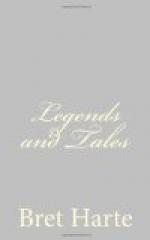It was very cold. The insidious fog penetrated his tightly buttoned coat, and set his teeth to chattering in spite of the aid he sometimes drew from a pocket-flask. His clothes were wet and the stern-sheets were covered with spray. The comforts of fire and shelter continually rose before his fancy as he gazed wistfully on the rocks. In sheer despair he finally drew the boat toward the most accessible part of the cliff and essayed to ascend. This was less difficult than it appeared, and in a few moments he had gained the hill above. A dark object at a little distance attracted his attention, and on approaching it proved to be a deserted cabin. The story goes on to say, that having built a roaring fire of stakes pulled from the adjoining corral, with the aid of a flask of excellent brandy, he managed to pass the early part of the evening with comparative comfort.
There was no door in the cabin, and the windows were simply square openings, which freely admitted the searching fog. But in spite of these discomforts,—being a man of cheerful, sanguine temperament,—he amused himself by poking the fire, and watching the ruddy glow which the flames threw on the fog from the open door. In this innocent occupation a great weariness overcame him, and he fell asleep.
He was awakened at midnight by a loud “halloo,” which seemed to proceed directly from the sea. Thinking it might be the cry of some boatman lost in the fog, he walked to the edge of the cliff, but the thick veil that covered sea and land rendered all objects at the distance of a few feet indistinguishable. He heard, however, the regular strokes of oars rising and falling on the water. The halloo was repeated. He was clearing his throat to reply, when to his surprise an answer came apparently from the very cabin he had quitted. Hastily retracing his steps, he was the more amazed, on reaching the open door, to find a stranger warming himself by the fire. Stepping back far enough to conceal his own person, he took a good look at the intruder.
He was a man of about forty, with a cadaverous face. But the oddity of his dress attracted the broker’s attention more than his lugubrious physiognomy. His legs were hid in enormously wide trousers descending to his knee, where they met long boots of sealskin. A pea-jacket with exaggerated cuffs, almost as large as the breeches, covered his chest, and around his waist a monstrous belt, with a buckle like a dentist’s sign, supported two trumpet-mouthed pistols and a curved hanger. He wore a long queue, which depended half-way down his back. As the firelight fell on his ingenuous countenance the broker observed with some concern that this queue was formed entirely of a kind of tobacco, known as pigtail or twist. Its effect, the broker remarked, was much heightened when in a moment of thoughtful abstraction the apparition bit off a portion of it, and rolled it as a quid into the cavernous recesses of his jaws.




